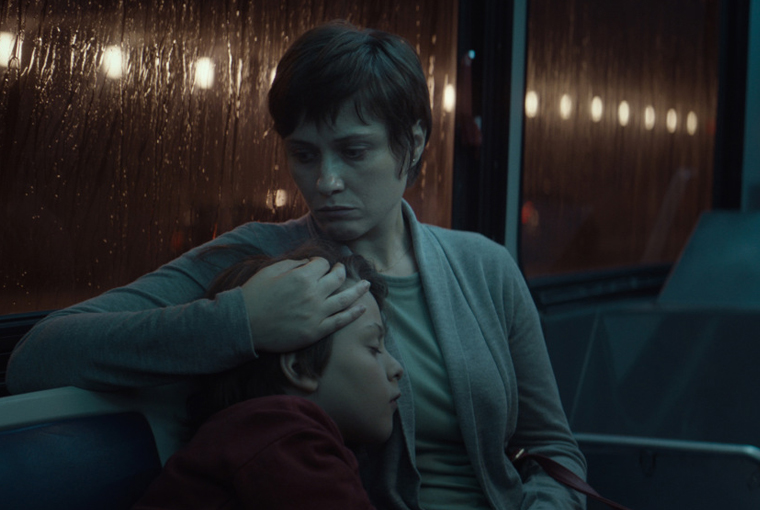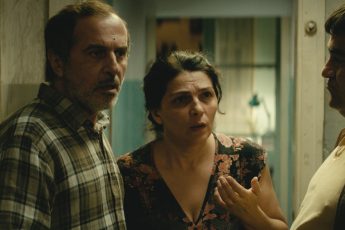'When Life Gives You Lemons…'
Ioana Uricaru’s Lemonade (Luna de miere, 2017)
Vol. 83 (March 2018) by Jack Page
Mara, a well-educated and highly employable young mother, relocates from Romania to the United States to live with her newlywed husband Daniel. Through her son’s company, Mara applies for a green card and, while in the process, is subjected to the flawed systems of government. Her journey becomes one of endurance, and her unwavering optimism and determination are pushed to their limits when she encounters corrupt immigration officer Moji. Within the margins of a xenophobic community and absurd bureaucracy, Mara’s ideal of the American dream is quashed along with her hopes for the future.
In Lemonade, Mara (played by Malina Manovici) is abused through many outlets of authority and patriarchy. When Mara receives an unexpected vaccination at the hospital, it makes her sick only moments later in the car. Her unsupportive husband Daniel (Dylan Scott Smith) gives her a look of disgust as she vomits into her own cupped hands, complaining: “They can’t just put something inside your body without your consent”. This scene foreshadows the moment Mara is sexually assaulted by her immigration officer Moji (Steve Bacic). Uricaru employs a mirroring technique in both scenes, pairing the two male characters as equally villainous. Mara is always framed from a higher angle than the driver, looking shrunken and deflated in the passenger seat of the car’s interior. She is also offered tissues from the glove-box compartment on both occasions to unceremoniously clear up her vomit and Moji’s semen. From the outset of the film, Mara is manhandled by doctors conducting invasive check-ups and degrading physical examinations. Government officials ask her unnecessarily impertinent questions regarding her green card application and policemen are prone to offensive – if indirect – misconduct. It is fair to say then, that rape or variations of its kind (whether they be physical, metaphorical or psychological) act as a hugely affective recurring motif. The corrupt figures of fragile masculinity posses a more universal level of meaning as well. By abusing their authority, their power and their rights, they intend to reflect upon the fundamental flaws embedded in the political and economical institutions set up by America. Their tendency to “mansplain”, their casual racism and rampant sexism, are not meant to be understood as individual cases but as the face of a whole nation. Their ideals are based in the same archaic traditionalism that founded the American dream.
The relationship between husband and wife is cautiously problematic and Uricaru offers the couple plenty of scenarios that call into question the validity of their so-called romance. The scenes Mara and Daniel share lack any sort of intimacy; while the two occupy the same domestic space, they interact as if they were merely co-workers. There is also an unspoken, mutually beneficial agreement between the two. Mara, trained as a nurse, has the medical know-how to care for Daniel, who is undergoing dialysis treatment. Daniel, as a citizen of the US, can offer Mara the chance to live in America with her son to start a new, supposedly advantageous life. When Daniel is denied compensation from his insurance company for an accident, Mara is a source of financial aid when she sells her property in Romania. Their alliance is constantly reduced to that of a transaction, which is complicated further when the other man in her life – Moji – sexually blackmails her.
Blackout curtains poorly disguise the windows as daylight seeps in from outside. An upbeat country song plays on the radio, ever so slightly louder than the dull buzzing noise emitting from the crooked lampshades. An unopened bottle of champagne sits in a melting bucket of ice, almost floating. Mara sits, bewildered and defeated, by the front door of the sleazy motel room. The situation she finds herself in is like a living nightmare. This kind of setting in cinema is notoriously ominous, yet commonplace for the despondent Mara and her tortuous existence since having emigrated from Romania to the US. It is here that she attempts to confront her immigration officer Moji in the hope that she may bribe him. His interest, however, lies solely in sexual favors rather than monetary gain and Mara’s green card application is at risk of being denied. The paranoid blackmailer Moji orders Mara to strip, wishing to reveal any secret recording devices or wires she may be concealing. To avoid exacerbating her ordeal further, she undresses in order to appease him. Covering herself with only a tea towel, she begs and pleads with Moji to reconsider his plan. At this point, Mara’s vulnerability and humiliation are displayed ever so openly. She bares all both physically and emotionally until she is left with nothing else to offer or bargain with. Moji initially feigns pity and promises not to touch her until he tries to sexually assault her. She retaliates and narrowly escapes being raped as Moji swears, laughing heartily, while taking nude photographs of her struggling to clothe herself as she flees from the motel. It is a thoroughly distressing and despicable scene, yet it encapsulates all the kinds of pain that Mara is forced to suffer.
Uricaru’s debut feature is an embittered and scathing vision of immigrant life in contemporary America. Ultimately, Mara’s story is one that intends to crystallize the impossibility to resist, work outside of, or just avoid the overreaching grasp of toxic masculinity. Lemonade is a tremendously hard-hitting film that pulls no punches, yet it is also somewhat heavy-handed. There is an unbelievable amount of prejudice, exploitation and abuse laid upon Mara that does overplay the director’s political ideology. Aside from this imbalance, Uricaru’a Lemonade remains very much within the same canon as other Romanian New Wave cinema: culturally rich, relevant and realist.




Leave a Comment